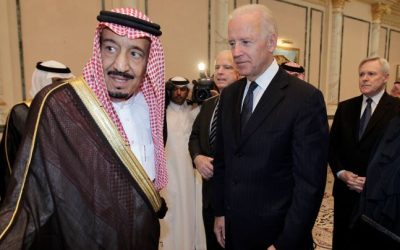The Joe Biden MBS Crown Prince Confrontation: Biden’s Failed Attempt to Turn Saudi Arabia Against Russia

All Global Research articles can be read in 51 languages by activating the “Translate Website” drop down menu on the top banner of our home page (Desktop version).
To receive Global Research’s Daily Newsletter (selected articles), click here.
Follow us on Instagram and Twitter and subscribe to our Telegram Channel. Feel free to repost and share widely Global Research articles.
***
During his visit to Jeddah on July 15, American President Joe Biden tried to convince his Saudi partners to increase oil production and delivery in order to inflict economic damage on Russia and turn the Arab country towards an anti-Moscow policy. Instead, Biden’s visit to the Red Sea city was a complete disaster, just as his administration’s foreign policy has been.
Following the US president’s three-day tour of Israel, Jordan and Saudi Arabia, which began on July 13 with an emphasis on restoring relations with the important Middle Eastern power and world’s largest oil exporter, commentators and experts noted Biden’s failure.
Washington attempted to get Middle Eastern countries to oppose Moscow over its military operation against Ukraine, but this was to no avail. The US’s traditional partners did not support its policy towards Kiev; not only did Saudi Arabia refuse Biden’s recent demands, but it is recalled that the UAE abstained and did not vote for the anti-Russian resolution proposed by the US in the UN Security Council.
Biden wanted the Middle East, especially the Saudis and the Emiratis, to increase oil supplies at low prices. The US president and G7 countries hoped that a lack of Russian oil would be compensated by oil from these countries.
In addition, Biden hoped that his Middle East tour would signal his promise that the US would remain active in the region so as not to allow Russia, China and even Iran to take its place. Following the Donald Trump administration, the US felt that its presence in the Middle East was weakened and that Russia, China and Iran have advanced.
Along with the American military bases dotted all across the Middle East, Washington provides significant financial support to a number of key countries, primarily Israel, but also Egypt. As Egypt is a crossroads between Africa and Asia, Egypt has continued to receive significant US support. The US also promised support to Jordan in the shape of weapons and training of military personnel. But this has not translated into anti-Moscow policies by these states.
What was evident though is that Biden did not prepare correctly for his Middle East tour. The American president went to a country that he promised would be ostracised on the international stage, and then accused Crown Prince Mohammed bin Salman Al Saud (MBS) of the murder of Saudi journalist Jamal Khashoggi.
MBS, who will inevitably become the king of Saudi Arabia in the near future, denied responsibility for Khashoggi’s 2018 killing at the Saudi Arabia consulate in Istanbul despite Biden claiming that US intelligence contradicted his claims. The Crown prince countered Biden with the sexual and physical abuse of prisoners at Iraq’s Abu Ghraib prison by US military personnel and the killing of Palestinian American journalist Shireen Abu Akleh in the West Bank by Israeli forces.
In even greater damage to Biden’s failed visit to Saudi Arabia, Prince Faisal bin Farhan, the Saudi foreign minister, said:
“The Crown Prince responded to President Biden’s remarks on … Khashoggi after quite clearly — that this crime, while very unfortunate and abhorrent, is something that the kingdom took very seriously (and) acted upon in a way commiserate with its position as a responsible country. These are issues, mistakes that happen in any country, including the US. The Crown Prince pointed out that the US has made its own mistakes and has taken the necessary action to hold those responsible accountable and address these mistakes just as the kingdom has.”
What Biden’s failed visit to Saudi Arabia showed to many in the Middle East is that the current US administration is incapable of conducting foreign policy.
Biden’s failures are obviously mirrored in the US, where Biden’s popularity is crashing. According to the latest CNN poll conducted by SSRS, Biden has reached the lowest ratings in his political career. His current approval rating, according to CNN, is 38%, with disapproval standing at 62%.
Given Biden’s own unpopularity in the US, partly because he insults the intelligence of American citizens by falsely claiming that Russia is to blame for soaring inflation and living costs, it is unsurprising that non-Americans are also finding the American president intolerable.
It is recalled that Saudi Foreign Minister Adel al-Jubeir stated that an agreement on oil had not been reached and that the OPEC countries will make a decision in their early August meeting based on the market, “not on speculations, not on hysteria, not on geopolitics.” Effectively OPEC announced that it will not be turned into anti-Russia vehicle for the US to use.
Biden was advised not to go to the Middle East, but his administration is desperate to restore relations with Saudi Arabia. This Middle East trip should be the biggest wake up call to Biden that the extremely short-lived unipolar world order is over and that states are not only capable of acting independently now, but are more boldly willing to do so.
*
Note to readers: Please click the share buttons above or below. Follow us on Instagram and Twitter and subscribe to our Telegram Channel. Feel free to repost and share widely Global Research articles.
Ahmed Adel is a Cairo-based geopolitics and political economy researcher.
Featured image is from InfoBrics

